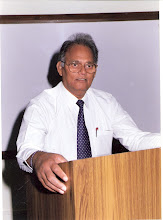A politician came calling on me, about five years back, as a part of his, cyclic five yearly- election campaign. He had his sten-gun toting guard in tow, and was very prominently parading a new gizmo that he had acquired just then.
”That is a cell-phone,” he explained to me.
I politely explained to him that we keep the same in pocket and it works there from too. There was no need to hold it in the hand like a scepter, all the while.
Much later though, I realized his predicament, when he received a call. He was not comfortable at all accepting it. He was struggling, with the buttons. He was visibly embarrassed.
A rare phenomenon in his species.
This was just about five years ago. Now you notice every other person having a cell-phone and using it as if it were an extension of the arm.
No big deal.
In the earlier era, the pace, speed and reach of technological changes was slow. Engineering colleges were teaching with the help of a sectional model of 450 rpm,” I. C. engines”, to their wide-eyed wards, for more than four generations. Nothing was changing radically.
The technology is advancing rapidly. The frequency and urgency of updating one’s knowledge is unprecedented in the wired world that we live in today.
There are certain well-accepted processes of acquiring,
“NEW KNOWLEDGE “.
The basic idea is to reflect on the new knowledge, with a view to understanding it and integrating the same with the one already known to you. If one adopts this method then the acquisition of new knowledge becomes easier and lasting.
Taking the same example of the cell phone, if; I were to teach my politician friend the modalities, I will first explain to him with the help of; a chord-less phone, at his residence, the similarities.
He is comfortable with the known device. After that he has to focus his attention on the changes involved. This is known as the first step,
• SELECTION.
• REHEARSE the same, by keeping the cell phone in his working memory, actively, and focus on the differences.
• MEANINGFUL LEARNING is the next stage. This involves relating it to the context one knows, and then understanding the dissimilarities.
• INTERNALLY ORGANIZING, the new learning and in depth absorbing of the wireless telephony, follows. This signals the subordinate concepts such as forwarding the calls, recalling, registering, storing, deleting etc.
• ELABORATING THE NEW KNOWLEDGE, by now relating it to the one earlier known
• TO VISUALIZE the new knowledge, mentally and to go away from the cordless-phone model is the last step.
• Accept the new technology, as it is. Leave the walker of the chord-less phone now.
He is now ready to tackle the SMS, WAP technology etc., too, which is application of the new knowledge and enriching it further.
What is true about, the cell phone is true in many other cases.
For example many of us use the computer, still in the mode of a typewriter. The finer points are left alone unutilized.
How do you acquire the new knowledge?
Systematically go about it as detailed above and you will have made the new knowledge as a part of you.
One need not have to think of the typewriter, to accept the new technology of voice-activated computers, transmitting voice data etc. Leave QWERTY, now and take the stride.
That is the route to “new- knowledge’s”, acceptance and acquisition.
M.S. RANADE.
mranade@vsnl.com
PUBLISHED IN INDIAN EXPRESS PUNE EDITION, THURSDAY, 8TH MAY 2003.
Monday, February 4, 2008
Subscribe to:
Post Comments (Atom)

No comments:
Post a Comment